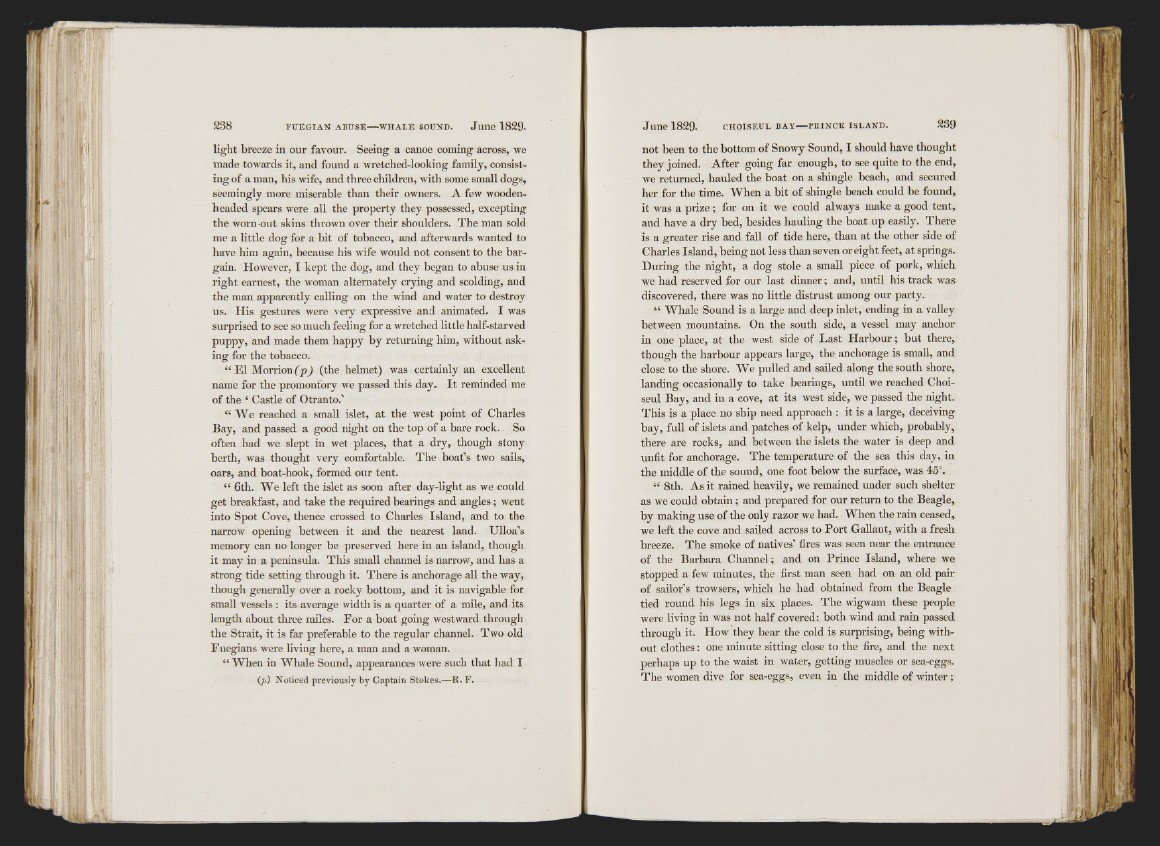
' IN
I.
r : '/'4:
i:': 4
■¡
I : "
: i H -
T , ,1
i
i ! I!
i'
light breeze in our favour. Seeing a canoe coming across, we
made towards it, and found a wretchedJooking family, consisting
of a man, his wife, and three children, witli some small dogs,
seemingly more miserable than their owners. A few woodenheaded
spears were all the property they possessed, excepting
the worn-out skins thrown over their shoulders. The man sold
me a little dog for a bit of tobacco, and afterwards wanted to
have him again, because his wife would not consent to the bargain.
However, I kept the dog, and they began to abuse us in
right earnest, the woman alternately crying and scolding, and
the man apparently calling on the wind and water to destroy
us. His gestures were very expressive and animated. I was
surprised to see so much feeling for a wretched little half-starved
puppy, and made them happy by returning him, without asking
for the tobacco.
“ El Morrion (p ) (the helmet) was certainly an excellent
name for the promontory we passed this day. It reminded me
of the ‘ Castle of Otranto.’
“ We reached a small islet, at the west point of Charles
Bay, and passed a good night on the top of a bare rock. So
often had we slept in wet places, that a dry, though stony
berth, was thought very comfortable. The boat’s two sails,
oars, and boat-hook, formed onr tent.
“ 6th. We left the islet as soon after day-light as we could
get breakfast, and take the required bearings and angles; went
into Spot Cove, thence crossed to Charles Island, and to the
narrow opening between it and the nearest land. UUoa’s
memory can no longer be preserved here in an island, though
it may in a peninsula. This small channel is narrow, and has a
strong tide setting through it. There is anchorage all the way,
though generally over a rocky bottom, and it is navigable for
small vessels : its average width is a quarter of a mile, and its
length about three miles. For a boat going westward through
the Strait, it is far preferable to the regular channel. Two old
Fuegians were living here, a man and a woman.
“ When in Whale Sound, appearances were such that had I
(p) Noticed previously by Captain Stokes.—R. F.
not been to the bottom of Snowy Sound, I should have thought
they joined. After going far enough, to see quite to the end,
we returned, hauled the boat on a shingle beach, and secured
her for the time. When a bit of shingle beach could be found,
it was a prize ; for on it we could always make a good tent,
and have a dry bed, besides hauling the boat up easily. There
is a greater rise and fall of tide here, than at the other side of
Charles Island, being not less than seven oreight feet, at springs.
During the night, a dog stole a small piece of pork, which
we had reserved for our last dinner; and, until his track was
discovered, there was no little distrust among our party.
“ Whale Sound is a large and deep inlet, ending in a valley
between mountains. On the south side, a vessel may anchor
in one place, at the west side of Last Harbour; but there,
though the harbour appears large, the anchorage is small, and
close to the shore. We pulled and sailed along the south shore,
landing occasionally to take bearings, until we reached Choiseul
Bay, and in a cove, at its west side, we passed the night.
This is a place no ship need approach ; it is a large, deceiving
bay, full of islets and patches of kelp, under which, probably,
there are rocks, and between the islets the water is deep and
unfit for anchorage. The temperature of the sea this day, in
the middle of the sound, one foot below the surface, was 45°.
“ 8th. As it rained heavily, we remained under such shelter
as we could obtain; and prepared for our return to the Beagle,
by making use of the only razor we had. When the rain ceased,
we left the cove and sailed across to Port Gallant, with a fresh
breeze. The smoke of natives’ fires was seen near the entrance
of the Barbara Channel; and on Prince Island, where we
stopped a few minutes, the first man seen had on an old pair
of sailor’s trowsers, which he had obtained from the Beagle
tied round his legs in six places. The wigwam these people
were living in was not half covered: both wind and rain passed
through it. How they hear the cold is surprising, being without
clothes: one minute sitting close to the fire, and the next
perhaps up to the waist in water, getting muscles or sea-eggs.
The women dive for sea-eggs, even in the middle of winter;